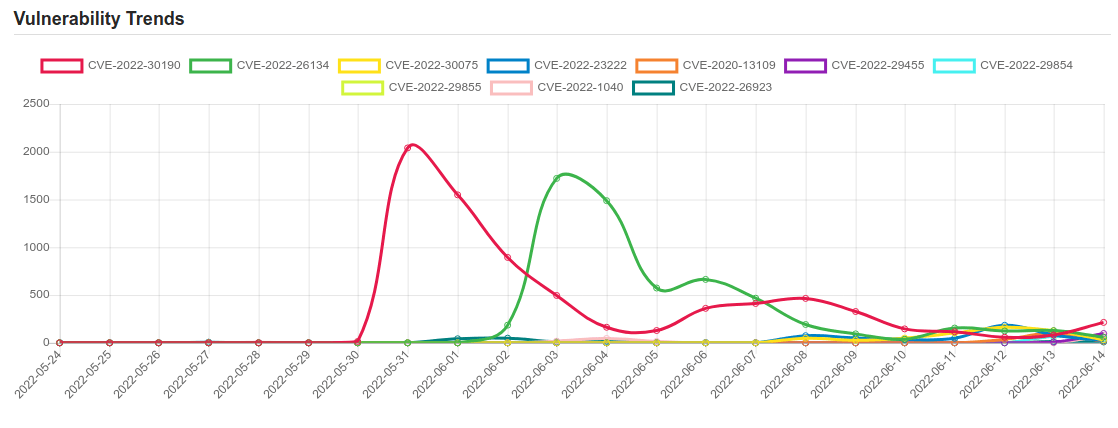Daily Vulnerability Trends: Wed Jun 15 2022

| CVE NAME | CVE Description |
| CVE-2022-29847 | In Progress Ipswitch WhatsUp Gold 21.0.0 through 21.1.1, and 22.0.0, it is possible for an unauthenticated attacker to invoke an API transaction that would allow them to relay encrypted WhatsUp Gold user credentials to an arbitrary host. |
| CVE-2022-22954 | VMware Workspace ONE Access and Identity Manager contain a remote code execution vulnerability due to server-side template injection. A malicious actor with network access can trigger a server-side template injection that may result in remote code execution. |
| CVE-2018-13379 | An Improper Limitation of a Pathname to a Restricted Directory (“Path Traversal”) in Fortinet FortiOS 6.0.0 to 6.0.4, 5.6.3 to 5.6.7 and 5.4.6 to 5.4.12 and FortiProxy 2.0.0, 1.2.0 to 1.2.8, 1.1.0 to 1.1.6, 1.0.0 to 1.0.7 under SSL VPN web portal allows an unauthenticated attacker to download system files via special crafted HTTP resource requests. |
| CVE-2022-1388 | On F5 BIG-IP 16.1.x versions prior to 16.1.2.2, 15.1.x versions prior to 15.1.5.1, 14.1.x versions prior to 14.1.4.6, 13.1.x versions prior to 13.1.5, and all 12.1.x and 11.6.x versions, undisclosed requests may bypass iControl REST authentication. Note: Software versions which have reached End of Technical Support (EoTS) are not evaluated |
| CVE-2022-25845 | The package com.alibaba:fastjson before 1.2.83 are vulnerable to Deserialization of Untrusted Data by bypassing the default autoType shutdown restrictions, which is possible under certain conditions. Exploiting this vulnerability allows attacking remote servers. Workaround: If upgrading is not possible, you can enable [safeMode](https://github.com/alibaba/fastjson/wiki/fastjson_safemode). |
| CVE-2022-0847 | A flaw was found in the way the “flags” member of the new pipe buffer structure was lacking proper initialization in copy_page_to_iter_pipe and push_pipe functions in the Linux kernel and could thus contain stale values. An unprivileged local user could use this flaw to write to pages in the page cache backed by read only files and as such escalate their privileges on the system. |
| CVE-2022-22620 | A use after free issue was addressed with improved memory management. This issue is fixed in macOS Monterey 12.2.1, iOS 15.3.1 and iPadOS 15.3.1, Safari 15.3 (v. 16612.4.9.1.8 and 15612.4.9.1.8). Processing maliciously crafted web content may lead to arbitrary code execution. Apple is aware of a report that this issue may have been actively exploited.. |
| CVE-2022-31043 | Guzzle is an open source PHP HTTP client. In affected versions `Authorization` headers on requests are sensitive information. On making a request using the `https` scheme to a server which responds with a redirect to a URI with the `http` scheme, we should not forward the `Authorization` header on. This is much the same as to how we don’t forward on the header if the host changes. Prior to this fix, `https` to `http` downgrades did not result in the `Authorization` header being removed, only changes to the host. Affected Guzzle 7 users should upgrade to Guzzle 7.4.4 as soon as possible. Affected users using any earlier series of Guzzle should upgrade to Guzzle 6.5.7 or 7.4.4. Users unable to upgrade may consider an alternative approach which would be to use their own redirect middleware. Alternately users may simply disable redirects all together if redirects are not expected or required. |
| CVE-2022-30190 | Microsoft Windows Support Diagnostic Tool (MSDT) Remote Code Execution Vulnerability. |
| CVE-2022-26134 | In affected versions of Confluence Server and Data Center, an OGNL injection vulnerability exists that would allow an unauthenticated attacker to execute arbitrary code on a Confluence Server or Data Center instance. The affected versions are from 1.3.0 before 7.4.17, from 7.13.0 before 7.13.7, from 7.14.0 before 7.14.3, from 7.15.0 before 7.15.2, from 7.16.0 before 7.16.4, from 7.17.0 before 7.17.4, and from 7.18.0 before 7.18.1. |
| CVE-2022-30075 | In TP-Link Router AX50 firmware 210730 and older, import of a malicious backup file via web interface can lead to remote code execution due to improper validation. |
| CVE-2022-23222 | kernel/bpf/verifier.c in the Linux kernel through 5.15.14 allows local users to gain privileges because of the availability of pointer arithmetic via certain *_OR_NULL pointer types. |
| CVE-2020-13109 | Morita Shogi 64 through 2020-05-02 for Nintendo 64 devices allows remote attackers to execute arbitrary code via crafted packet data to the built-in modem because 0x800b3e94 (aka the IF subcommand to top-level command 7) has a stack-based buffer overflow. |
| CVE-2022-29455 | DOM-based Reflected Cross-Site Scripting (XSS) vulnerability in Elementor’s Elementor Website Builder plugin <= 3.5.5 versions. |
| CVE-2022-29854 | A vulnerability in Mitel 6900 Series IP (MiNet) phones excluding 6970, versions 1.8 (1.8.0.12) and earlier, could allow a unauthenticated attacker with physical access to the phone to gain root access due to insufficient access control for test functionality during system startup. A successful exploit could allow access to sensitive information and code execution. |
| CVE-2022-29855 | Mitel 6800 and 6900 Series SIP phone devices through 2022-04-27 have “undocumented functionality.” A vulnerability in Mitel 6800 Series and 6900 Series SIP phones excluding 6970, versions 5.1 SP8 (5.1.0.8016) and earlier, and 6.0 (6.0.0.368) through 6.1 HF4 (6.1.0.165), could allow a unauthenticated attacker with physical access to the phone to gain root access due to insufficient access control for test functionality during system startup. A successful exploit could allow access to sensitive information and code execution. |
| CVE-2022-1040 | An authentication bypass vulnerability in the User Portal and Webadmin allows a remote attacker to execute code in Sophos Firewall version v18.5 MR3 and older. |
| CVE-2022-26923 | Active Directory Domain Services Elevation of Privilege Vulnerability. |
| CVE-2022-1998 | A use after free in the Linux kernel File System notify functionality was found in the way user triggers copy_info_records_to_user() call to fail in copy_event_to_user(). A local user could use this flaw to crash the system or potentially escalate their privileges on the system. |
| CVE-2022-1972 | No description provided |
If you like the site, please consider joining the telegram channel and supporting us on Patreon using the button below.


